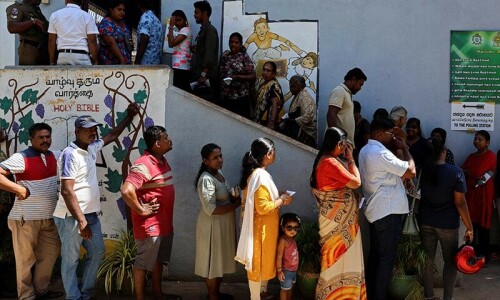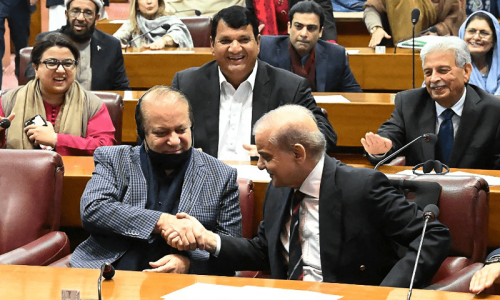A full one per cent increase in minimum deposit rate on bank deposits since September 2013, may keep at least cautious savers glued to banks. And the rise in prices of company stocks should attract more investment in local bourses.
Slower investment rise in National Saving Schemes, on the other hand, may eventually lead to higher returns on them, more so because of progressive monetary tightening. So, opportunities may open up for small investors.
“Raising non-bank borrowings has become all the more important, because rapid rupee depreciation is making external debt servicing costlier in terms of local currency,” says an official of the Ministry of Finance involved in domestic debt management.
The rupee has lost about nine per cent value against the dollar in five months to November. This means the local currency cost of every $1 billion worth of foreign debt servicing has already gone up by Rs9 billion. Between now and June 2014 Pakistan has to dish out more than $2 billion in external debt servicing (including $1.5 billion to the IMF alone).
The rupee counterpart of foreign exchange required for external debt servicing are not going to come from non-debt creating sources like total tax revenue that remains short of total expenses, because fiscal slippages are hard to contain.
The only available recourse is borrowing from the banking system. Borrowing from the central bank is most inflationary and will have to be reduced now as inflation enters the double-digit zone.
Then a sudden switchover to commercial bank borrowings from the central bank borrowings will be pricier. Besides, extra-large government borrowings from banks would crowd out the private sector. Things are getting complicated, all the more necessitating non-bank borrowings.
“So, one can expect higher returns on National Saving Schemes in near future,” says the Finance Ministry’s official, admitting that even this would not be easy due to tough competition from banks and stock market.
But from small savers and investors’ point of view, the situation is quite promising and loaded with opportunities. “Small savers, say those who have to employ Rs1 million or less in profitable avenues, can now choose between bank deposit schemes and NSS and stocks,” says treasurer of a local bank.
“They have nothing to worry about ongoing capital flight. It rather opens for some of them a riskier-but-high-yield investment in hard currencies and many of them are already into it, directly or indirectly,” says head of a Karachi-based foreign exchange company.
Nearly 47 per cent rise in KSE-100 index in the year to November 2013 is believed to have lured many estranged small investors back into stocks business. “And the hefty capital gains and decent dividends they are getting is expected to encourage them to stay on,” says a former chairman of KSE.
Investors’ return has averaged around 44 per cent this year and 155 per cent since January 2012 when the stock rally had started. “This is encouraging for small investors. And that is where banks are feeling the pinch of growing competition,” says a senior executive of state-run National Bank of Pakistan.
But banks, too, continue to witness a double-digit growth in their deposits which stood around Rs7.133 trillion last month, up 13 per cent year-on-year.
However, savings and current account deposits make up the bulk of (about 70 per cent) of total bank deposits, according to data pertaining to June this year.
“Whereas the linking of minimum deposit rate of banks to SBP’s repo rate is expected to keep growth in savings deposits intact, we expect a decline in term deposits where most banks won’t be able to offer returns matching NSS or stocks yield plus price appreciation value,” says treasurer of a large local bank.
But term deposits of banks have long lost the confidence of small investors—not merely due to interest rates consideration but also because investors have become more agile.
“Today’s investors are totally different from the save-for-the-rainy day old-timers,” says a former deputy governor of SBP. “As we shifted from a controlled economy to market-based economy in 1990s and as banking sector reforms of mid-1990s set the stage for financial deregulation, investors’ needs and priorities also changed. They just don’t want to save for the rainy day; they rather want to get optimal future value of their savings and investment.”
That keeps small but financially literate investors on constant lookout for better returns and enough options to switch over from one asset class to another, with easier exit options. “Fixed deposits don’t fit into it this scheme.”
The same is true for NSS. “Statistical evidence has to be collected to confirm this but on the face of it, investors’ agility and financial literacy have started affecting the pace of growth in the NSS stocks,” says a senior official of Central Directorate of National Savings.
Investment in the NSS in four months of this fiscal year has already plummeted to Rs64 billion from Rs184 billion in the year-ago period. One reason for this is rooted in rupee depreciation that accelerated withdrawal from the NSS by speculation-loving individuals and corporate investment-hoppers.
But another reason is that the upswing in stock market and higher bank deposit rates have facilitated even saner investors’ shift from NSS, chiefly to the stock market but also to banks. Several other avenues of investment are apparently attracting small investors’ money indirectly, and not without grave risks.
Take for example, the case of mushrooming of illegal so-called modaraba companies in Punjab that have swindled billions of rupees, largely from people of modest means.
Last week, legal action has been initiated against two such modarabas but many more continue to thrive, according to senior officials of Modaraba and NBFIs Association of Pakistan.
Bankers and stockbrokers admit that their failure to reach out to small savers in the far flung areas has often provided space to illegal investment schemes. But more than that, it’s the lack of innovation in financial products development.
“With branchless banking growing fast on the back of cellular phone technology, reaching out to people for deposit mobilisation is no big issue. Simplification of account opening process via designated kiosks and shops in rural areas is possible,” insists a senior executive of Allied Bank Ltd, boasting of the experiences his bank has made in this direction.















































